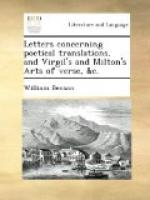“Angels, for ye behold him, and with Song.
And again,
“Fountains, and ye that warble as ye flow.
Nov. 27. 1736.
I am, SIR, _&c._
LETTER IX.
SIR,
To reply to the Opinion that Vossius has given in favour of French Verse compared with English, I would observe in the first Place that what the French call Heroick Verse, is the very worst Sort of Verse that can be contriv’d. If the Excellence of Verse consists chiefly in varying the Pause, as I have shewn it does in the Latin, and could do the same in the Greek and other Languages; what must be thought of that Sort of Versification in which the Pause is most strictly preserv’d in the same Place in every Line, be it for 10 or 20 thousand together, especially in Verses of 12 Syllables? Perhaps an Englishman may not be a very proper Person to make this Objection to French Verse: I will therefore produce the Opinion of several of their own Writers.
Ronsard, in the Preface to his Franciade, owns that their Alexandrine Lines have too much prattle (ils ont trop de caquet) and that it is a Fault in their Poetry that one Line does not run into another, and therefore he wrote his Franciade in Verses of ten Syllables, and broke the Measure. The Author of the History of French Poetry confesses, that the constant Pause in their Lines makes the Poetry tedious; and the judicious and learned Translator of Quintilian says directly, that it is owing to the continual Sameness of Numbers that their Verse cannot please long. In reality, it is a kind of Stanza, and ought to be so writ.
Jeune & vaillant Heros
Dont la haute sagesse
N’est point le fruit tardif
D’une lente vieillesse.
Not to insist upon the Prattle (as Ronsard calls it) of these two celebrated Lines; for what does Vaillant add to Heros, or haute to sagesse, and what is the Difference between tardif and lente? I say to let this pass, the eternal Repetition of the same Pause is the Reverse of Harmony: Three Feet and three Feet for thousands of Lines together, make exactly the same Musick as the ting, tong, tang of the same Number of Bells in a Country-Church. We had this wretched sort of Metre amongst us formerly, and Chaucer is justly stil’d the Father of English Verse, because he was the first that ever wrote in rhym’d Couplets of ten Syllables each Line. He found, by his Judgment, and the Delicacy of his Ear, that Lines of eight Syllables, such as Gower his Cotemporary wrote in, were too short, and the twelve Syllable-Lines too long. He pitch’d upon the other Sort just mentioned, and that is now found, by the Experience of so many Ages, to be the most




